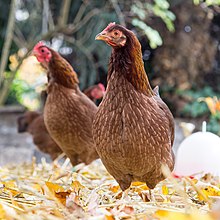This article needs additional citations for verification. (November 2016) |
The Welsummer or Welsumer is a Dutch breed of domestic chicken. It originates in the small village of Welsum, in the eastern Netherlands. It was bred at the beginning of the twentieth century from local fowls of mixed origin: Rhode Island Reds, Barnevelders, Partridge Leghorns, Cochins, and Wyandottes. In 1922–23, steps were taken to fix a standard after the birds began to show a good deal of uniformity. The eggs were originally exported for the commercial egg trade. Some stock was exported to the United Kingdom, and the breed was added to the British Standard in 1930.[citation needed]
 A Welsummer hen | |
| Other names | Welsumer |
|---|---|
| Country of origin | Netherlands |
| Use | dual-purpose |
| Traits | |
| Weight | |
| Skin colour | cream |
| Egg colour | dark brown |
| Comb type | single |
| Classification | |
| APA | continental[3] |
| ABA | single comb, clean-legged |
| EE | yes[4] |
| PCGB | soft feather: light[5] |
| |


In 2001, a number of farms culled their flocks in connection with the outbreak of foot-and-mouth disease.
Characteristics
editThree plumage colours are listed for the Welsumer by the Entente Européenne d’Aviculture et de Cuniculture, of which only one, Red Partridge, is recognised in the Netherlands.[4]
Use
editWelsumer hens lay about 160 eggs per year; the eggs are dark brown and weigh about 65 grams.[1] Bantam Welsumers lay about 180 dark brown eggs per year, with an average weight of 47 g.[2]
References
edit- ^ a b c Rassetafeln: Welsumer (in German). Bund Deutscher Rassegeflügelzüchter. Accessed September 2014.
- ^ a b c Rassetafeln: Zwerg-Welsumer (in German). Bund Deutscher Rassegeflügelzüchter. Accessed September 2014.
- ^ APA Recognized Breeds and Varieties: As of January 1, 2012. American Poultry Association. Archived 4 November 2017.
- ^ a b Liste des races et variétés homologuée dans les pays EE (28.04.2013). Entente Européenne d’Aviculture et de Cuniculture. Archived 16 June 2013.
- ^ Breed Classification. Poultry Club of Great Britain. Archived 12 June 2018.